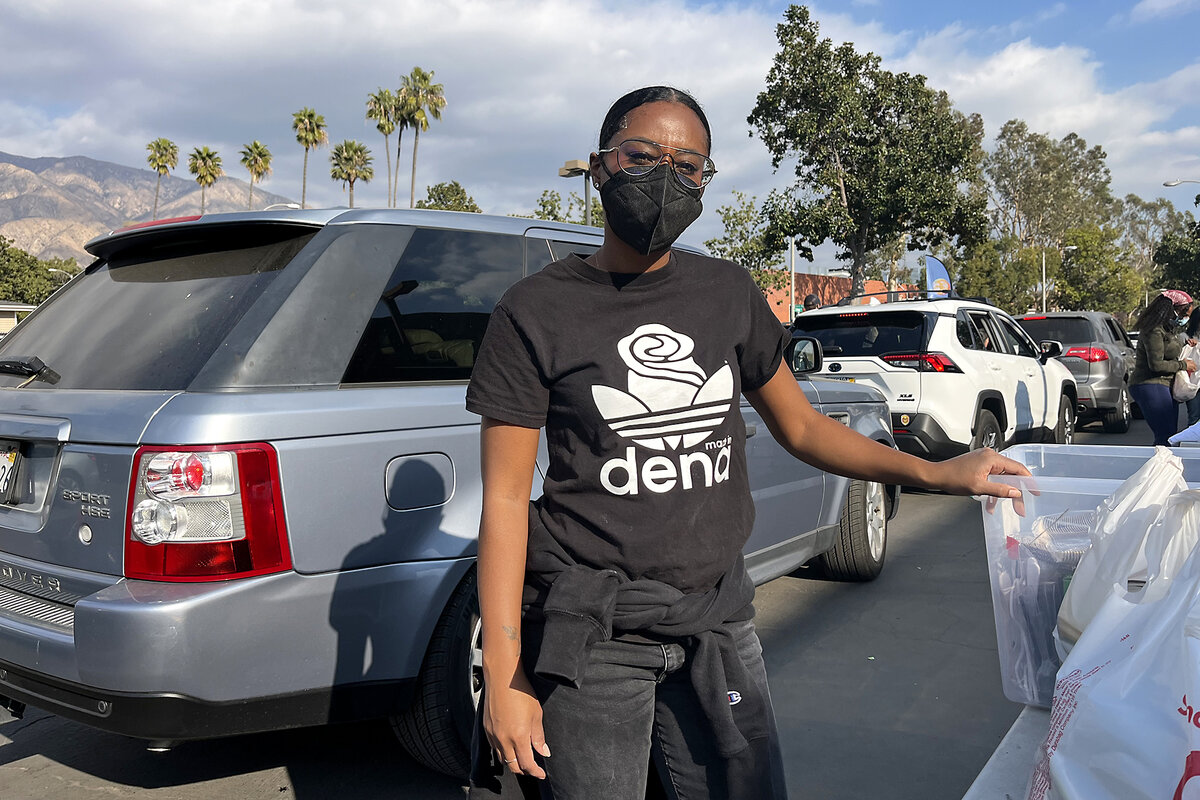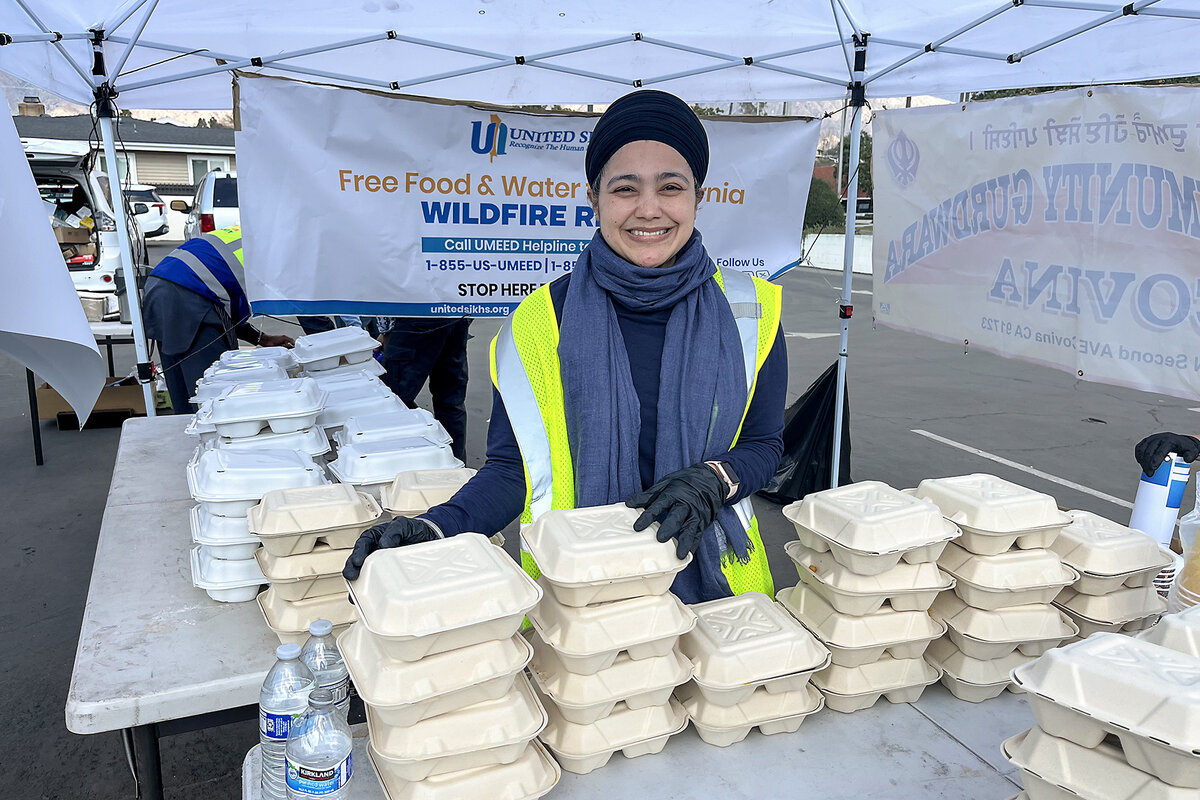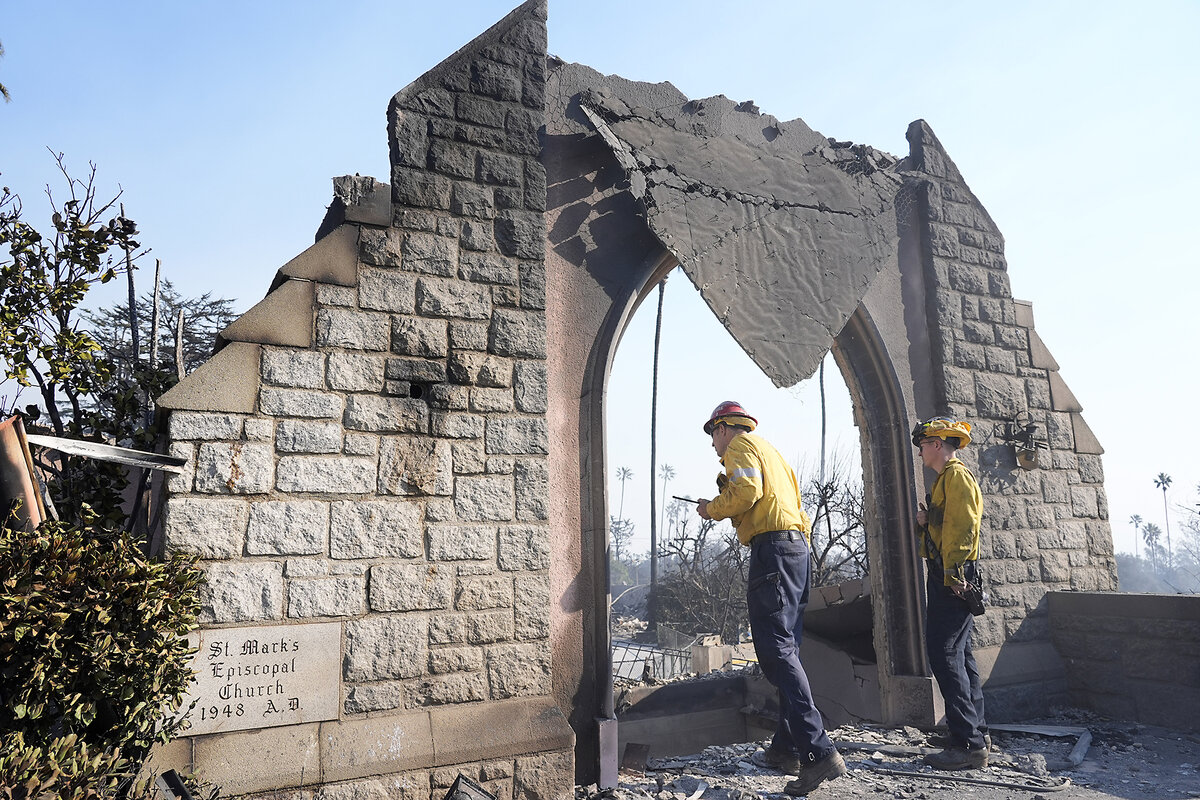LA fires claimed places of worship, but congregations still are helping others
Loading...
| Pasadena, Calif.; and Washington
Cars pull into the Pasadena Church parking lot, waved forward by a couple of Scientologists. Christian volunteers hand out groceries and diapers. Orange, yellow, and black turbans dot the crowded lot, as Sikh volunteers dish out hot chickpea curry and basmati rice and cups of steaming chai.
The line of cars stretches around the lot. Volunteers pass meals through car windows and load back seats with pet food, toiletries, and paper goods. Some Sikhs traveled from as far as New York and Canada to cook and serve meals to people displaced by the wildfires.
The chai, especially, gets five-star reviews from volunteers and evacuees alike.
Why We Wrote This
A story focused onOrganized religion provides space for worship and spiritual study. Amid disaster, it can also provide a built-in system of caring and an active faith.
“That’s what we’re really hoping to do here – it’s really offering solace, offering comfort, in this absolutely crazy time,” says Meetan Kaur, an organizer with United Sikhs, an international aid organization.
The Eaton Fire destroyed thousands of homes, schools, restaurants, and businesses. Houses of worship burned, too. But their congregations are still here, gathering to pray in borrowed spaces and distributing food and clothing. The interfaith outpouring of compassion and generosity is an example of faith in action, those interviewed say. And, they add, it shows the role of faith amid times of disaster.
Organized religion provides space for worship and spiritual study, but it can be especially helpful when disasters strike because there’s already “a built-in system of caring,” says Cynthia Eriksson, a dean at Fuller Theological Seminary, who specializes in the intersection of faith and mental health.
When people experience trauma or tragedy, it’s a natural impulse to try to understand why. “We try to find meaning in it,” says Dr. Eriksson, who attends a Presbyterian church. She had to evacuate, but her home was spared. She’s been careful not to say that she’s blessed, because “I didn’t want to make it that God somehow favored me, because I don’t believe that.”
At the Pasadena Church, Chanel Jackson is loading up SUV after SUV with free groceries. She attends the Faithful Central Bible Church in Inglewood, clear across Los Angeles. But she’s driven to this donation and distribution center by both her faith and her roots.
Ms. Jackson grew up in Altadena, so like several other volunteers, she says this is personal. Two of her schools burned. She knows some of the people in line. Sporting a “Dena” T-shirt – that’s what folks call the Altadena-Pasadena area – she talks about the imperative from Scriptures to help the poor.
“A lot of people – their faith is shaken,” she says. “They’re questioning God – ‘Why me?’ – which I completely understand and empathize with. But God is in the people; God is in the angels. God is in the people that are here at this relief center, trying to help families in need.”
“There has to be hope”
New fires have erupted this week, with the Hughes Fire causing tens of thousands more people to evacuate.
The tragedies and hardship calls on a core aspect of faith: community. “It’s about the connection to something bigger than ourselves,” says Rabbi Joshua Levine Grater, the director of Friends in Deed, a local interfaith nonprofit.
His family lost its house in the Eaton Fire, as well as its synagogue, where he was once head rabbi and is now a congregant.
Over a century old, Pasadena Jewish Temple & Center is gone. But leaders rescued 13 Torah scrolls before the building burned. When the fire died, one wall remained, etched with a mural that members didn’t know was hiding behind drywall. It depicts people and animals in the desert, beneath a single palm tree.
“My house burned, but I would never consider myself homeless,” says Rabbi Grater. He has resources, friends, community.
Founded 130 years ago, Friends in Deed focuses on the most needy people, operating a food pantry and providing housing assistance and case management. Since the fires, the requests for help have only increased. But so have the donations and volunteers.
Despite the uncertainty his family and so many others face, there’s only one choice, says Rabbi Grater. “We have to find the courage to rebuild a step at a time.”
To find that courage he turns to the liturgy and traditions of Judaism – like Shabbat – that ground him, says Rabbi Grater. “There has to be hope.”
The teachings and stories of the Torah are there as “reminders that there’s still an immense amount of love in the world.”
Service as a tenet of faith
In Altadena, at least five different places of worship succumbed to the wildfire, including the Altadena Community Church, St. Mark’s Episcopal Church, and the Masjid Al-Taqwa. First Church of Christ, Scientist, Altadena, whose edifice was spared, says it plans to share its space with nearby congregations once it’s safe to return.
The impulse to help in Greater Los Angeles cuts across all faiths and walks of life. Some volunteers have no religious affiliation and are simply here to serve.
The outpouring of generosity and support has been overflowing – from World Central Kitchen, the YMCA, and local artists providing aid, to retailers like Living Spaces offering free mattresses to the thousands of people who have become displaced.
But for some, that generosity is central to their faith.
A gurdwara is not just a place of worship, but also a place to coordinate and supply aid, says Gurvinder Singh, international humanitarian aid director for United Sikhs.
Seva, which translates to “selfless service,” is a call to action, says Mr. Singh. That goes hand-in-hand with the tradition of langar, a community meal.
“It’s really the basis of humanity,” says Ms. Kaur at the Pasadena Church. “It’s bonding through food.”
She calls langar “the great equalizer,” a meal shared by all that shows that no one is better than anyone else.
One hungry passenger, who lost her house in the fire, says the curry dish shared with her is a much-appreciated and hard-to-find vegetarian meal. “This is the best I’ve had.”








